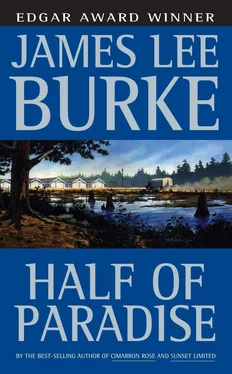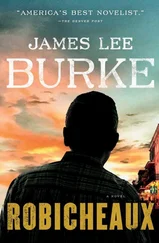“It’s good.”
The light of the paper lanterns, which swung slowly in the breeze, flickered on her face. Her dark eyes were bright and cheerful. Her arm brushed against him and he wished they were alone and not at the party. He opened a beer and drank out of the bottle. She took a sip and turned the chickens on the grill. The grease dripped down into the fire and sputtered on the coals. Wally came over with a highball glass in his hand.
“Hi, fellow. What did you bring?” he said.
“Dago red. Would you like some?”
“There’s a bottle of Vat 69 upstairs in the cabinet,” Suzanne said.
“Were you speaking French?”
“I don’t know any French,” Avery said.
“Seriously. Can you speak French?”
“We were practicing our Church Latin. We’re thinking of taking holy orders,” Avery said.
“That’s right. You are a Catholic, aren’t you? Denise told me. I say, have you read any of Joyce?”
“Why don’t you get another highball, Wally?” Suzanne said.
“What do the Jesuits think of Joyce?”
“I didn’t go to school under the Jesuits,” Avery said.
“You look like a Jesuit. Melancholy eyes and that sort of thing.”
“For heaven’s sake, Wally. Get a highball,” Suzanne said.
“I’ve been doing some work on the Trinity theme in Ulysses . I think Joyce was actually orthodox in his Catholicism. Tell me, do Catholics really have to accept all of the Nicene Creed?”
“I’m not Catholic,” Avery said.
“Suzanne’s roommate told me you were.”
“Wally, go upstairs and get the Scotch. I’d like a drink, too,” Suzanne said.
“I’m sure there’s a relation between the Trinity and the Bloom family.”
“Who is the Bloom family?” Avery said.
“Isn’t it true that you’re Catholic?”
“No.”
“You are, aren’t you, Suzanne?” Wally said. “Once in a while.”
“Well, do you have to accept all the Nicene Creed?”
“I suppose. What does that have to do with anything?”
Wally forgot why he had asked. He began talking about Baudelaire.
“I’ve been reading him in French. You lose a lot in the translation,” he said. “Have you read The Flowers of Evil in French?”
“I read Ring Lardner and Rudyard Kipling my last year in high school,” Avery said.
“You don’t consider Lardner a serious writer, do you?”
“I’d like a highball. Would you fix me one, Wally?” Suzanne said.
“Do you really compare Lardner with someone like Baudelaire?”
“I liked his short stories,” Avery said.
“Tell me if you think Lardner could be compared with any French writer of worth.”
“You’re tight,” Suzanne said.
“I just want to know if anybody can believe Ringgold Lardner was a good writer.”
“If you won’t get the Scotch, open a beer for me, please,” she said.
“Lardner never wrote a decent page of prose in his life,” Wally said.
“Wally, will you please be quiet.”
“And Kipling, for God’s sake. Can you tell me of anyone more undeserving who has received as much attention?”
Avery looked at his whiskey-red face and didn’t say anything. A young man came over from the steps and put his arm on Wally’s shoulder. He winked at Suzanne.
“Come talk to us, old sock,” he said. “We want to hear about your poems.”
“They’re completely worthless.”
“Also about your short story in the Atlantic,” the young man said.
“It’s worthless, too. The Atlantic has a policy of not publishing anything of merit.”
“Come sit down and have a Scotch with us,” the young man said. He was a portrait painter who had done well with the Saint Charles Avenue upper class. His hair was black and he had a good suntan and his teeth were white when he smiled.
“Stop this goddamn patronizing attitude,” Wally said. “If there is anything I can’t stand, it’s to be patronized when I’m drunk.”
The others in the courtyard stopped talking and looked at Wally. The young portrait painter felt that attention was being focused on him, also. He smiled and put his hand on Wally’s shoulder again. His teeth shone, and he gave an appearance of composure and easiness of manner.
“I’m not patronizing you,” he said in a low voice, smiling.
“Do you know one thing about the amount of work that goes into a good piece of fiction?”
“Come over and tell us about it.”
“Do you think that painting some aristocratic pig on Saint Charles is art?”
“Now look, Wally.”
“Tell me.”
“I’ll discuss it with you when you’re not crosseyed.”
“You don’t know anything about art, whether I’m sober or not.”
“Let’s have a drink. This is rather pointless, isn’t it?”
“Hell it’s pointless. I want to know right now if you think painting these pigs is art.”
Suzanne turned to Avery and spoke quietly. “Take him outside for a while. I’ll serve dinner.”
“I’m going out for cigarettes. Do you want to come?” Avery said to Wally.
“How am I in any way involved with your smoking habits?”
“I thought you might like to take a walk.”
“All right. I know I’m obnoxious. I’ll leave,” he said. “I apologize, painter. You’re an artist. Your pigs will be hung in the Louvre someday.”
They went out of the courtyard into the street. They walked along the sidewalk in the dark under the balconies and colonnades in front of the apartments with the trees hanging over the walk, the tattoo parlors, antique shops, the small lighted restaurants with the steamed windows, the ten dollar a week rooming houses that catered to the Tony Bacino clientele, the pool halls and bars and Salvation Army missions, past the girls who stood in the darkened doorways and smiled woodenly, and across the street to the grocery store on the corner with the big screen doors and the green shutters and coarse-grained floors and the rusted Hadacol sign and the glass cases of chewing tobacco and cigars.
Avery bought a package of Virginia Extra and poured the tobacco into the wheat-straw paper. He and Wally walked back towards the apartment. Avery struck a match and lighted the cigarette and watched the paper curl away from the flame.
“How do you feel?” he said.
“Nonrepentant,” Wally said.
“You made it a little hard on Suzanne.”
“I didn’t mean to, old pal. My bile is directed only towards pretentious painters. I can’t tolerate that fellow. He’s such a goddamn boor.”
“Do you think you can go back in now?”
“I’m in excellent shape. By the bye, can we forget that Lardner business?”
“Sure.”
“I know I’m bloody insulting when I get on the grog.”
“Forget about it.”
“It’s merely that I don’t like Kipling or Lardner. Neither of them could write. I can’t understand how these people are given attention.”
“Do you want a smoke?” Avery said.
“Lardner wrote Saturday Evening Post fiction.”
Avery walked on listening and not answering.
They passed a package store just before they got to the apartment.
“I say, could you let me have a couple of dollars?” Wally said. “I’m out of booze and I don’t like drinking off the others all evening.”
Avery gave him the money. Wally bought a pint bottle and put it in his coat pocket, and they went back into the courtyard. The guests were eating the barbecued chickens from paper plates with their fingers, and Suzanne was serving several other people who had just arrived. Avery looked at her damp temples and the way her body moved against her dress. He took a beer out of the tub of crushed ice and opened it. The foam came out over the top of the bottle and slid down the side onto his hand.
Читать дальше












